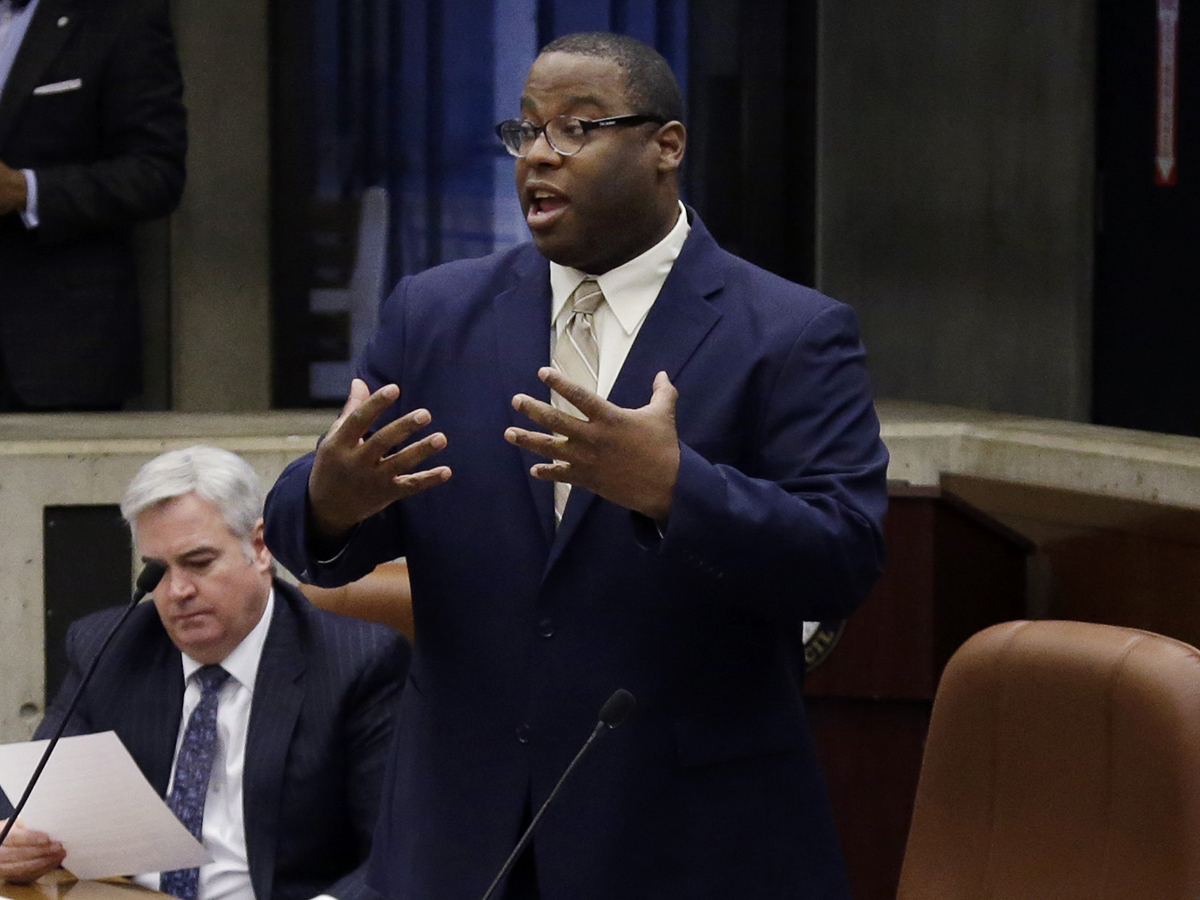Tito Jackson’s Campaign Sure Is Spending a Lot of Dough on Eating Out

Photo via AP
As Tito Jackson strives to unseat Mayor Marty Walsh, he’s spending a lot of time—and campaign funds—dining out. And the tabs are piling up: There was the $217 dinner at Gather, in the Seaport, and the $390 feast at Chef Chow’s House, in Brookline. The mayoral candidate even dropped $244 at the notorious tourist trap Cheers.
Over the past two years, in fact, Jackson has spent more than $12,000 in campaign money on two- and three-digit restaurant, bar, pizza-shop, and sushi-joint tabs. In 2016 alone, Jackson shelled out around $5,700 on upscale and downscale eats at places ranging from Abe & Louie’s to Tasty Burger, from Blue Dragon to UNO’s. So far this year, his campaign has spent nearly $1,500 on food—including a $108 meeting with a consultant at Boston Beer Works and a $215 campaign lunch at Cheesecake Factory, according to a review of records kept by the state’s Office of Campaign and Political Finance (OCPF). Jackson’s campaign listed meal expenses at least 80 times in both 2015 and 2016, and at least 20 times so far this year.
An analysis of the public records—tallying Jackson’s meals with colleagues, staffers, constituents, and consultants—reveals that the candidate has charged more lunch and dinner bills to his campaign account than just about anyone else in a similar position. More than nearly all his colleagues at City Hall, more than anyone from the clown car of candidates who ran for mayor in 2013, and certainly more than Mayor Marty Walsh, who despite spending all kinds of money on other things isn’t expensing entrées (with some exceptions, like a staff dinner at Capital Grille for the State of the City).
It’s important to note that Jackson’s campaign isn’t exactly rolling around in cash like Scrooge McDuck. Or even like his opponent, Walsh, for that matter. With the election about eight months away, Jackson has roughly $91,000 in his war chest; Walsh, by contrast, has more than $4 million. Since January, when Jackson announced he would challenge Walsh in this fall’s mayoral election, Jackson has spent $58,000 campaigning. Walsh has spent $483,000.
Jackson says he can explain why his expense account stands out. As a candidate with an enormous gap between his funding and that of his opponent, he says he does a lot of wining and dining to get face time with people who might end up donating money later on, or could provide other valuable support. It’s also his style, he notes, to sit with potential voters and hear them out over a meal. He can’t exactly pay for lavish fundraiser banquets right now, he says, but he can buy a nice lunch.
“I am running and have run a grassroots campaign, which is about building relationships with like-minded individuals who are focused on advancing the city of Boston,” Jackson says, “and so it has been my strategy to do this in smaller, more intimate settings. I use my resources wisely.”
To put Jackson’s spending habits in context, we also reviewed Walsh’s campaign spending when he was a candidate in 2013. While Walsh’s team racked up its share of expenses at places like Emmett’s Pub and Ruth’s Chris back in 2011, 2012, and the first two-and-a-half months of 2013, the tab was thousands short of what Jackson has spent dining out in that same time period. As mayor, Walsh doesn’t expense lunches or dinners to City Hall, according to campaign spokeswoman Rachel Goldstein. “Mayor Walsh pays for his own meals,” Goldstein says.
As an aside, when it comes to catering—rather than meals at restaurants—Walsh is outspending Jackson exponentially. Last year, he spent more than $200,000 on food and other expenses for events like a $17,000 birthday fundraiser at Venezia, OCPF records show. In the same period, Jackson’s spending on similar items was about $9,000.
No one, by the way, is suggesting that using campaign funds to buy expensive dinners, or even a $2 coffee at Dunkin’, is illegal. While the law is strict on how funds can come in to a campaign’s coffers, it is quite permissive when it comes to how campaigns spend money. With a few exceptions, state regulators mostly just ask candidates to keep detailed records of what they buy with donors’ money. “The general rule,” says Jason Tait, OCPF spokesman, “is that candidates can make expenditures to enhance their political future, so long as it’s not primarily personal.”
So is Jackson’s dining on campaign dollars out of line? It depends on whom you ask.
Scott Ferson, a veteran Democratic campaigner and president of the Liberty Square Group, says it is unusual but understandable. “As you’re out and cultivating people and staff and potential donors, particularly when you’re trying to build relations or expand, it’s natural to do it over food,” says Ferson, who isn’t affiliated with either campaign for mayor. On the other hand, Adam Hurtubise, another Liberty strategist, disagrees, saying Jackson’s restaurant spending “seems high.”
While Ferson and Hurtubise have different opinions on Jackson’s spending, they both agree that dropping such large sums on dinners and drinks has the potential to hamstring an underdog’s campaign, especially an underdog who already has limited funds. Rather than sushi and steaks, they suggest, the money might be better spent on newspaper ads or direct mailers.
For now, though, Jackson is sticking to his strategy, supplementing a grassroots campaign with plates of grass-fed beef.


